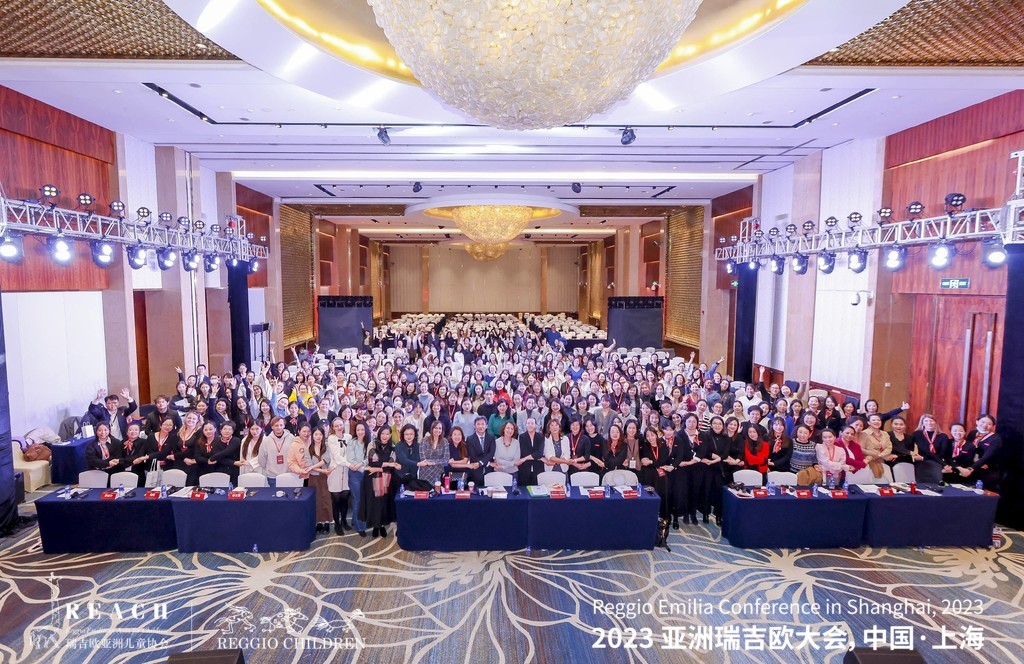
The two-day Reggio Emilia conference in Shanghai attracted over 500 educators from around the world, showcasing a wonderful example of cross-national border collaboration. As shared by Reggio speakers, Paola and Marina, “The Reggio Emilia approach encourages us to transcend geographical boundaries such as countries and languages, as well as to break through the limits of art, science, culture, and philosophy. With an open mindset, we embrace both the expected and unexpected that children bring to us.” This conference was a true and wonderful demonstration of how the Reggio Emilia approach inspires educators to transcend various limitations and jointly pursue a broader educational vision. I feel truly honored to have been a part of it.
The presentations of the two Reggio speakers were full of wisdom and insights, and listening to the wonderful learning stories they shared prompted me to reflect more deeply on the role of the teacher… The basic responsibilities of Reggio teachers may seem to be no different from those of most teachers, but from the learning stories they are particularly good at building relationships with young children, engaging in meaningful dialogues, stimulating children’s thinking, and facilitate deep learning. They are always energetically engaged in their interactions with children, employing a range of methods such as observation, active listening, documentation, and responsive approaches to assist children in their in-depth inquiry. Reggio educators always uphold the values of respecting for the individuality, embracing differences, active learning and participation, and it is with these values in mind that teachers convey positive concepts to children, including a passion for life, commitment, effort, and dedication. As Paola stated in the conference “…our approach is more about helping children to construct (interpret the world) maps of meaning. Beyond that, our task is to work with young children to build their desire to learn, to better encounter and understand the world.”
The practices of Reggio educators inspire us that we need to listen attentively to children’s voice in our daily activities, change our perspective on children from the inside, build the “relationship”-oriented teacher-child interaction, and make research a conscious habit and attitude of life, so that we can truly see the “richness of the child” and become wise teachers. When our teachers continuously reflect on the above practices, it means that they have grasped the “Ariadne’s thread” that Malaguzzi has metaphorically described, embarking on a journey inspired by Reggio Emilia Approach.
为期两天的亚洲瑞吉欧大会,吸引了来自世界各地的500多名教育工作者,展示了跨越国界协作的美好典范。正如瑞吉欧专家Paola和Marina所分享的,“瑞吉欧教育理念鼓励我们超越国家和语言等地理边界,跨越艺术、科学、文化、哲学等领域的界限,怀揣开放的心态,迎接幼儿带给我们的意料之中和意料之外”。这次会议成为了一个真实而美妙的例证,展示了瑞吉欧理念如何激励教育者们超越各种限制,共同追求更广阔的教育视野…能参与其中,我深感荣幸。
两位瑞吉欧专家的演讲充满智慧和深刻见解, 在聆听了他们讲述的一个又一个美妙的学习故事后,促使我对教师的角色进行了更深入地反思…瑞吉欧教师的基本职责看似与大多数教师并无差别,但是从学习故事中可以看出他们特别擅长同幼儿建立关系,开展对话,推动幼儿的思考,进行深度学习。他们总是带着旺盛的活力参与到与幼儿的互动中,通过观察、倾听、记录、回应等一系列方式协助幼儿深入开展探究。瑞吉欧教育者始终秉持尊重主体、接纳差异、积极学习、主动参与的价值观,也正是在这些价值观的引领下,教师向幼儿传递了积极正向的理念,包括对生活的热爱、承诺、努力和投入。正如Paola在大会中说过的这句话“…我们的方法更多是帮助幼儿去建构(解释世界)意义的地图。除此之外,我们的任务是与幼儿一同建立他们学习的愿望,更好地遇见这一世界,了解这一世界。”
瑞吉欧教育者的实践启示我们,在日常活动中需要用心聆听幼儿的声音,从内心改变看待幼儿的方式,构建“关系”为先的师幼互动,把研究当作一种自觉的生活习惯与态度,真正看见“丰富的幼儿”,成为充满智慧的教师。当我们的教师能不断反思以上实践时,意味着大家已经手握马拉古奇曾比喻的“阿里阿德涅之线”,踏上了受瑞吉欧教育的启发之旅。
Reflection by:
Carol Yang
Education Director
EtonHouse China
25 and 26 November 2023
Shanghai, China
Reggio Emilia Experiences in Dialogue: Making Learning Extraordinary